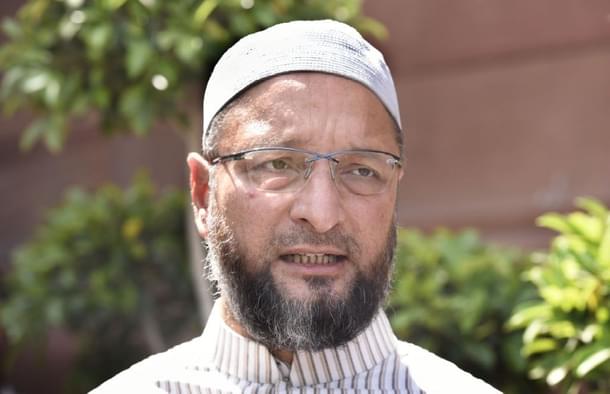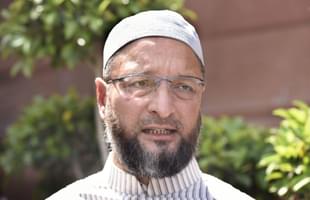Politics
The Dangers Of Asaduddin Owaisi’s ‘Composite’ Culture
Swarajya Staff
Apr 03, 2019, 06:29 PM | Updated 06:29 PM IST
Save & read from anywhere!
Bookmark stories for easy access on any device or the Swarajya app.


In Hyderabad, the verdict is out even before the general elections could take place. “Owaisiich jeetinga,” is the common refrain.
For eight straight Lok Sabha elections, the All-India Majlis-e-Ittehadul Muslimeen (AIMIM) has won the Hyderabad parliamentary seat — nine, if you count 1984, when Asaduddin Owaisi’s father won as an Independent candidate. Owaisi, who inherited the seat, is in the fray for the fourth time.
The Constituency Itself Offers The First Advantage
After delimitation of constituencies in 2008, when Vikarabad, Tandur and Chevella were excluded from the Hyderabad Lok Sabha seat, AIMIM retained only those areas, where their margins of victory were higher.
With a 65 per cent share of Muslims in the voting list, and the Owaisi brothers — Asaduddin and Akbaruddin — as the messiahs of Muslims in Hyderabad, their victory is a given.
Keeping The Paranoia Going
Beyond that, the Owaisis work hard to keep the Muslims’ loyalty to them alive — by uniting against the ‘enemy’, the Bharatiya Janata Party (BJP), Narendra Modi government and the Rashtriya Swayamsevak Sangh (RSS). The stream of victimhood narrative has created deep ravines in the ability of Muslims to trust the state and the above mentioned groups; the resentment and paranoia runs deep, and there is often a call to be prepared for rising to the occasion and protesting.
All this, while convincing them that they are safe only because of the AIMIM. Asaduddin Owaisi’s ongoing ‘cause’ — ‘reclaiming dignity’ — a call to Muslims to unite to fight against oppression and better living conditions, ever denied to them, touches raw nerves, stokes passions and keeps the hatred alive. More importantly, it keeps him bound to the people as a saviour, and keeps the people bounded to each other, for a cause.
Don’t Believe In Development
People in the old city believe that they are safe and living in peace only because of the AIMIM, and they don’t seek anything beyond that. They are stoic when asked about the near-inhuman living conditions in areas that they inhabit, with scarce water supply, electricity and pathetic sanitation and road conditions.
The area bears a stark contrast to new areas of Hyderabad which keep the city in the news time and again for being a happening place, topping all those indices of ease of living, ease of doing business and digital governance.
Owaisi’s campaigning in the dingy streets often has people imploring for water and electricity, and for better drainage to get rid of the permanent stench. To some, he assures time-bound redressal. But that’s only around during election time.
With such low levels of development, where even basic needs are not met, it is both an irony as also a puzzle that Owaisi shows the maximum utilisation of MPLADS (Members of Parliament Local Area Development Scheme) funds (129 per cent) among all Telangana MPs.
Of course, a mere percentage of utilisation, without work wise details, means little. The Central Information Commissioner (CIC) last year had asked for a legal framework for MPLADS which would make MPs accountable and answerable.
The integrity of the brothers is also not beyond question.
Both brothers are out currently showcasing their ‘developmental work’ in Hyderabad. There are suddenly, systematic news stories regarding each project and the progress report.
The Owaisis are reportedly generous and gracious with the media.
Don’t Believe In Democracy
If creating paranoia be one prong, the other AIMIM is keeping the booths in Owaisi’s control. Rigging has been passé in his constituency, with polling agents taking over booths after a certain point in time, on the voting day.
Low voter turnouts help. In Hyderabad, voters are indeed complacent, with AIMIM’s winning assured. Overtly, of course, the Owaisi brothers are exhorting people to come out and vote.
Also, AIMIM reportedly opposed linking Aadhaar card with the voter’s photo identity card in Hyderabad. By controlling officials involved in the cleaning up of the electoral roll, the party was able to retain bogus voters, under locked homes, untraceable addresses and vacant plots.
It must also be remembered that Rohingyas had fraudulently obtained voter ID cards in Hyderabad by falsely declaring themselves as Indian citizens. There are an estimated 5,025 Rohingyas taking shelter in Hyderabad, after the influx began in 2013.
Party’s Methods Are Questionable; Illegal Activities Shielded
Then again, here is a party, whose methods are highly questionable; in short, it thrives on the strength of most things illegal. Widely recognised as ‘goons’ in Hyderabad, they encourage their supporters to steal power. The total power theft in the old city alone accounts for 47 per cent of the total power consumed (the norm in the state is 12 per cent), and officials are manhandled and assaulted if they try to rectify the meters; even the police is unwilling to accompany officials saying it is a sensitive area.
Owaisi brothers are alleged to stand by and shield traders engaged in ‘murky’ activities, as also Illegal encroachments in the Charminar area – development be damned, Metro rail line be damned and Charminar being listed as a UNESCO site be damned.
Despite his overt condemnation of terror group Islamic State (IS), Asaduddin Owaisi had offered legal help to the youth arrested in Hyderabad three years ago, for being a member of an IS module. There are rumours that several terrorists are breeding in the old city — a fact which Owaisi certainly ‘wouldn’t be ignorant of’.
Appeals As An Educated, Elite Muslim
The dangerous part in all this is that Asaduddin Owaisi’s cool and sophisticated exterior camouflages his nefarious agenda well. While brother Akbaruddin is a known rabble-rouser, Asaduddin comes across through his oratory and demeanour as being ‘right-minded’, ‘gentle’ and ‘humble’. This, coupled with his education, in a largely backward community, helps grow his support base.
And even though people admittedly often do not like the younger brother, Asaduddin’s charisma goes so far as to keep them from questioning why he shows no regret for his brother’s speeches, why he would coexist with him, and whether they would in fact share the same agenda.
The Dangerous Road Ahead
“The Hyderabad Parliament Seat is a voice against oppression, discrimination and exploitation,” reads a tweet by Asaduddin Owaisi on 30 March, along with a video of his brother exhorting people to come out and vote. First, does this behove a Lok Sabha MP asking for votes?
But more than that, this one statement reveals the line the brothers have adopted for some time now: taking the appeal of the party beyond Muslims. A ‘composite culture’ as they term it, which would include Dalits, tribals, etc.
Going further, in a recent interview to a TV channel, Asaduddin Owaisi said: “Hyderabad ke Parliament ki seat, Sangh Parivar ke oppression ko rokne ka instrument hai. This seat does not belong to Asaduddin Owaisi, but to those 30 crore people in India who are opposed to Narendra Modi’s fascist ideology”.
This strategy unites different subsets of people, who are beginning to look upon him as someone who has the capability of lifting the weight of backward Indians. “He is taking along not just Muslims, but also Dalits, OBCs and other pichhde log with him,” says a watcher of politics in Hyderabad. “He is adopting Maududi’s path”. Maududi proposed a united front with marginalised sections of Indian society for the triumph of Islam.
Maududi was a socio-political philosopher, who founded Jamaat-e-Islami towards making post colonial India an ‘Islamic nation’, which would be a cure for all social and economic problems that Muslims faced. His modus operandi was winning over leaders through education and propaganda. Does it strike a familiar chord?
“This ‘composite’ culture is dangerous, growing and would be difficult to counter, because it preys on our divisions,” says a Hyderabad-based researcher and author.





